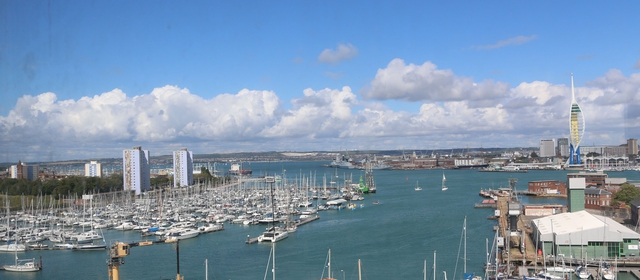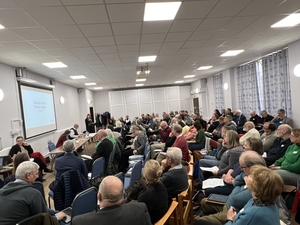
Diocesan Synod, November 2021
ELECTION OF HOUSE OF CLERGY/LAITY
Recent elections to Diocesan Synod meant that this was the first meeting of the newly-elected synod members. Members were therefore asked to vote on who would chair the respective Houses of Clergy and Laity:
- Canon Bob White was elected chair of the House of Clergy
- Debbie Sutton was elected chair of the House of Laity
PRESIDENTIAL ADDRESS
Our commissary bishop, Bishop Rob Wickham, reflected on the story of Jesus resurrecting Lazarus – the brother of Mary and Martha – from the dead. Each of the four people in the story have different characters and react in different ways. He challenged us to think which of these four people we might relate to best, and invited synod members to journey together, aware that our own responses to issues are bound up in our own characters and backgrounds. Read the full version here.
INTRODUCTION TO THE NEW SYNOD
Diocesan Secretary Victoria James introduced the workings of Diocesan Synod, including details of Standing Orders, and how meetings are organised and chaired. Canon Nick Ralph spoke about the demographics of Portsmouth diocese and gave an insight into the Mosaic data that provides specific information of what types of people live in each of our parishes and deaneries. He invited us to think about how representative our congregations are of their wider communities and challenged synod to consider how our decision-making ensures that our focus is on those not yet engaged in our churches. You can contact Nick for details of that Mosaic data here.
DIOCESAN STAFF TEAM UPDATE
Victoria James talked about the staff team, which was restructured around 12 months ago, with a number of redundancies made (12 people, amounting to 9.3 full-time equivalent posts) as we adjusted to post-Covid life. She mentioned that we are unique in partnering with other dioceses (primarily Winchester and Guildford) in certain diocesan roles and teams. Now that all three of those dioceses had been through restructuring processes, the numbers involved were clearer.
Our diocesan staff team consists of 48 individuals, who between them fill 39.6 full-time equivalent roles, of which 32 are dedicated to Portsmouth. It is one of the smallest diocesan staff teams in the C of E, but because much of the work is statutory, a smaller team are effectively covering the same workload. Among the changes were the closure of Portsmouth and Winchester Diocesan Academies Trust and the transfer of our academy schools to the Diocese of Chichester Academy Trust.
BISHOP’S COUNCIL UPDATE
Synod members heard about the latest work of the Bishop’s Council, which is included in a Paper 1 here. Among the items discussed were safeguarding, risk management, governance, the clergy wellbeing officer, and the bill passing through the Ghanaian Parliament that would criminalise LGBT+ people for being who they are. On the latter point, our senior staff had issued a statement (which you can read here) expressing their dismay at the stance of Anglican bishops in Ghana, who have supported the bill.
Synod members had questions about whether we had received a response from the Ghanaian bishops (it was reported there had been a conversation between Bishop Jonathan, our bishop-designate, and Archbishop Cyril, Archbishop of Ghana). Diocesan Synod members voted to endorse the statement made by our senior leadership about the stance taken by the bishops in Ghana.
In relation to the clergy wellbeing post, and the support being extended through Health Assured, there was a question about whether those tasked with counselling our clergy through this service have a Christian background. Those professionals engaged through this service are trained in their field and support people in a wider range of contexts. While it is possible they might be Christians, it is not guaranteed.
GENERAL SYNOD
Our six newly-elected representatives on General Synod were introduced to Diocesan Synod members, and invited to outline their strengths and weaknesses, and what they were looking forward to. You can see who has been elected to serve on the Church of England’s General Synod to represent our diocese here.
The next General Synod meeting takes place on November 16-17.
DIOCESAN BUDGET 2021
Director of Finance Lisa Streeter presented the 2022 budget to synod, which you can read in full as Paper 2 here. The elongation of the consultation period for our vision/strategy and the impact of Covid meant that Bishops’s Council had to opt for a one-year budget, rather than the three-year budget they would have preferred to offer to synod.
Lisa presented synod members with some of the key variables that had been considered in drawing up the 2022 budget, and outlined the reasoning behind increases in clergy stipends and lay staff salaries. She also outlined on which areas the diocesan budget was spent. The 2022 budget, as agreed by the Bishop’s Council, based on a 95% collection rate for parish share, predicted a deficit of £1.1m in 2022, which would be met by diocesan reserves. It would involve an overall three per cent increase in parish share. Individual parish allocations will be circulated via the deaneries later in November.
Among the questions and points raised during the debate were: -
- What would happen if we voted against this budget?
- Could more money be spent from reserves?
- Could an assurance be given that next year’s budget would be a three-year budget?
- How can we choose to increase parish share at a time when church giving and attendance is declining?
- We paused the Live | Pray | Serve process of change because we weren’t sure what kind of change to make. So of course our budget has to be a holding one, until we work out the future shape of the diocese.
- Good to see more spending on clergy housing, but how will that pay into efforts to achieve carbon net zero?
- This isn’t a budget, but a short-term financial plan. How many parishes can go on using reserve to pay parish share?
- It would have been good to have more than one option to look at.
- We need to reduce the budget deficit this year while we prepare a three-year budget
- In areas of deprivation, a 3% increase in parish share is impossible to achieve.
The chair of our diocesan finance committee, Philip Poulter, said that the 3% increase was the overall ask across the diocese, and it is not the case that each parish will see a 3% increase, as the allocations are worked out through the formula. The factors within that formula (affluence and average weekly attendance, as well as the overall change in average weekly attendance) impacts the levels of increase or decrease for each parish.
He also emphasised that the £1.1m loss is being paid from diocesan reserves. Essentially, we were buying ourselves time by using reserves to allow further work on strategic planning and for the arrival of Bishop Jonathan.
Synod members voted by Houses in favour of the budget. This meant that if any of the three houses (House of Bishops, House of Clergy and House of Laity) voted against the budget, the motion would fail. All three houses voted in favour of the 2022 budget as presented, and for the collection of £5.122m in parish share.
LIVE PRAY SERVE UPDATE
Synod members had been given an update on the Live | Pray | Serve vision and strategy, which is in Paper 3 here. Members were able to ask questions and to debate the motions they were asked to approve. Among the comments were: - Should there be additional elements to the bullet points about the next steps, including treating each other with love and care, respecting different beliefs and traditions, and developing a new set of viability criteria? - Requiring parishes to fill key offices before recruitment of clergy would militate against communities that struggle to fill those roles. - Mission Action Plans are significant for growth, so should be required for all parishes, not just where there is a vacancy. - How can a parish create a Mission Action Plan from scratch, if in vacancy? - If a parish is unable to create a Mission Action Plan by itself, that might be a good reason for collaboration with neighbouring parishes.
Synod members approved the next steps in the Live Pray Serve process, and also some recruitment principles to act as a guide for the commissary bishop when considering any recruitment process.
